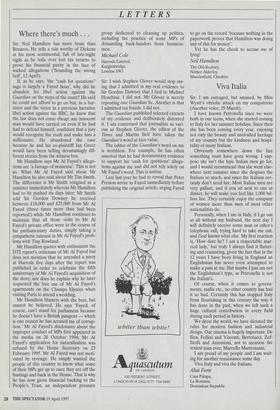LETTERS Where there's much . . .
Sir: Neil Hamilton has more brass than Benares. He tells a tale worthy of Dickens at his most sentimental, full of late-night vigils as he toils over lost tax returns to prove his financial purity in the face of wicked allegations (`Sounding the wrong bell', 12 April).
If, as he says, 'the "cash for questions" saga is largely a Fayed hoax', why did he abandon his libel action against the Guardian on the steps of the court? He said he could not afford to go on but, as a bar- rister and the victor in a previous lucrative libel action against the BBC, he knew that the law does not come cheap; any innocent man would have carried on even if he had had to defend himself, confident that a jury would recognise the truth and make him a millionaire. He abandoned the case because he and his co-plaintiff Ian Greer would have been telling devastatingly dif- ferent stories from the witness box.
Mr Hamilton says Mr Al Fayed's allega- tions are 'a farrago of nonsense'. This is not so. What Mr Al Fayed said about Mr Hamilton he also said about Mr Tim Smith. The difference is Mr Smith resigned as a minister immediately whereas Mr Hamilton had to be pushed six days later; Mr Smith told Sir Gordon Downey he received between £18,000 and £25,000 from Mr Al Fayed (three times more than had been reported!) while Mr Hamilton continues to maintain that all those visits to Mr Al Fayed's private office were in the course of his parliamentary duties, simply taking a sympathetic interest in Mr Al Fayed's prob- lems with Tiny Rowland.
Mr Hamilton quotes with enthusiasm the DTI report's criticisms of Mr Al Fayed but does not mention that he attended a party at Harrods five days after the report was published in order to celebrate the fifth anniversary of Mr Al Fayed's acquisition of the store; nor does he explain why he later requested the free use of Mr Al Fayed's apartments on the Champs Elysdes when visiting Paris to attend a wedding.
Mr Hamilton blusters with the best, but cannot be believed. He says 'Fayed, of course, can't stand for parliament because he doesn't have a British passport — which is one reason he has accused me of corrup- tion.' Mr Al Fayed's disclosures about the improper conduct of MPs first appeared in the media on 20 October 1994; Mr Al Fayed's application for naturalisation was refused by the Home Secretary on 23 February 1995. Mr Al Fayed was not moti- vated by revenge. He simply wanted the people of this country to know what some of their MPs get up to once they are off the hustings and back in the House. That is why he has now given financial backing to the People's Trust, an independent pressure group dedicated to cleaning up politics, including the practice of some MPs of demanding back-handers from business- men.
Michael Cole
Harrods Limited, Knightsbridge, London SW1


































































 Previous page
Previous page